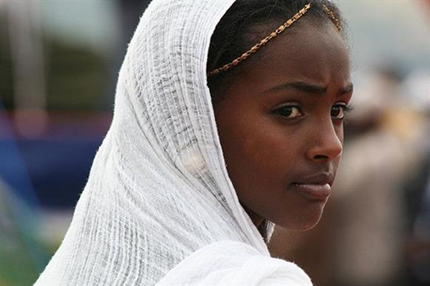Ethiopian women face new threat of human trafficking as
economic gains slow to trickle
down

Women in Ethiopia live under constant fear of violence, illness, hunger and poverty but they are now also facing a new threat – human trafficking, according to veteran women’s rights campaigner Bogaletch Gebre.
Although a state-led industrial drive has transformed Ethiopia into one of Africa’s fastest-growing economies, a third of its 99 million citizens still survive on less than $1.90 a day – the World Bank’s measure of extreme poverty.
Girls are often regarded as a financial burden on their families in the Horn of Africa country long blighted by cycles of disease, drought, hunger and conflict, and expected to drop out of school to get married or find employment.
“When a child is born a girl in Ethiopia … she is born into servitude. She is literally there to serve the family,” Gebre said, as she recalled growing up in the 1960s in Kembatta, southern Ethiopia. “It’s a tragedy.”
In the past decade, human traffickers have increasingly lured girls away from their schools and homes in poor, rural areas with the promise of jobs and other opportunities in cities like the capital Addis Ababa, Gebre said.
But many ended up being exploited as maids and sex workers.
Because prostitution is taboo in Ethiopia, especially in the rural areas where most of the trafficked girls come from, many find themselves ostracized if they return.
“An abducted girl can never return home. She is considered damaged goods,” Gebre told the Thomson Reuters Foundation in the office of the charity she founded in 1997 – Kembatti Mentti Gezzimma (KMG), which translates as Kembatta Women Standing Together.
The U.S. State Department’s 2016 Trafficking in Persons report found that girls as young as eight were working in brothels around Addis Ababa’s central market.
The State Department report also cataloged the abuses Ethiopian women face working as maids in the Middle East, including physical and sexual assault, the confiscation of their passports, withholding their salaries and confinement at work.
Since 2013, Ethiopia has banned its citizens from going to the Gulf to work as domestic workers, and last year enacted a wide-ranging anti-trafficking law that introduces stiffer penalties for traffickers and greater victim protection.
But more than 400,000 Ethiopians are still estimated to be trapped in slavery, according to the 2016 Global Slavery Index by human rights group Walk Free Foundation.
Despite the scale of the problem, Gebre said there was reason for optimism, pointing to advances in women’s rights that only a few years ago would have been unthinkable.
“Ethiopia women are waging a silent revolution,” said Gebre, who was due to speak next week about breaking taboos at Trust Women, a conference organized by the Thomson Reuters Foundation on women’s rights and human trafficking.
“For the first time women are learning that they are equal with men. That is a big change.”
For example, bridal abduction, the practice of kidnapping girls by men for marriage, is disappearing.
“A man who abducts a woman and forces her to marry him will be ostracized from his community,” said Gebre.
There’s also been progress on a cause close to Gebre’s heart – ending female genital mutilation, which is widely seen as a prerequisite for marriage in socially conservative Ethiopia.
Although overall FGM prevalence in Ethiopia remains high at 74 percent, the number of girls subjected to the practice has fallen dramatically with only 24 percent of under-15s having been cut, according to the U.N. children’s agency UNICEF.
This is about half the number undergoing FGM in 2000.
Gebre set up her charity to save girls from the ancient custom that killed her sister and nearly took her life too.
The practice, which involves the partial or total removal of the external genitalia and frequently ends in injury if not death, has almost been eradicated from Gebre’s home region.
Gebre’s personal story is itself a source of hope.
From a village where girls received little education, Gebre won a scholarship to study microbiology and physiology in Israel before securing a Fulbright scholarship for a masters degree in parasitology at the University of Massachusetts.
She completed a PhD in epidemiology at UCLA in California, before returning to Ethiopia to set up KGM.
“I am no different from the next girl in the village,” Gebre said. “If I could go to America for education, any of them could go to America for education.”

YOUR SHOPPING MADE EASY
Africa's Change Makers Magazine
COMPANY
AFRICAN ACHIEVERS INTERNATIONAL Inc. is a global media and technology company including lifestyle media publisher SEMA AFRICA
online
Magazine AFRICAN ACHIEVERS MAGAZINE, digital shopping
platform PA-BEAUTY STATION.COM, event management
PRIDE OF AFRICA, awards program AfIA
AWARDS, youth and talent development, PILLARS OF
HOPE and AAK, Volunteerism
UNIVERSIDAY grassroots community support
NAD and financial support
REMITGROW and monthly subscription box AAi Must
Have. ....
More from African Achievers International
PLATFORM
About Sema
Africa
Our
Team
Contact
Us
Jobs
Internship
Upcoming Events
Get a Domain/Website
Mama Africa - My Story
Write for Sema Africa
Advertise
Promote your Events
Travel
Policies
Archive
SUBSCRIBE






